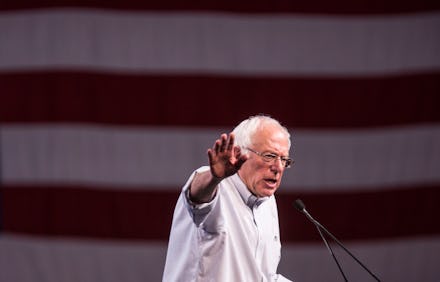Bernie Sanders Just Introduced a Bill That Would Transform Voting in America

Sen. Bernie Sanders (I-Vt.) has introduced a bill in the Senate that would make Election Day a national holiday called "Democracy Day."
"We should be doing everything possible to make it easier for people to participate in the political process," Sanders said in statement about the bill. "Election Day should be a national holiday so that everyone has the time and opportunity to vote. While this would not be a cure-all, it would indicate a national commitment to create a vibrant democracy."
The bill he introduced was part of a package of proposals that were announced on the 50th anniversary of the Voting Rights Act. The other bill he unveiled mandates that states automatically register eligible citizens to vote.
The Vermont populist has long called for a wide variety of reforms aimed at ensuring the voting booth is more accessible to citizens and shielded from disproportionate influence by wealthy donors and corporations. Sanders is a co-sponsor of a constitutional amendment to overturn the Supreme Court's 2010 Citizens United decision, which ruled that corporations were free to contribute to independent efforts to sway elections. He's also said that a commitment to overturning the decision would be a litmus test for his nominee for a Supreme Court justice, should he be elected to the White House.
Why does it matter? Sanders' plan to make Election Day a holiday is a major proposal in the guise of a modest one. There's a great deal of evidence that supports the common-sense idea that making voting easier makes people more likely to vote.
A report by the International Institute for Democracy and Electoral Assistance cites a study that shows that weekend voting significantly boosts turnout in democracies around the world. Year after year, United States Census data shows that significant numbers of people cite being "too busy" as a reason they don't make it to the voting booth. It's safe to assume that "busy" often means someone can't afford to skip a few hours of work, especially in areas notorious for long lines.
Registration problems are also referred to in census polls to as a reason some people don't vote. The U.S. places an unusual onus on voters to make sure they have the option of voting, as you can see in the chart below from a report by the Brennan Center for Justice:
Given that the U.S. ranks near the bottom in voter turnout when compared with other affluent democracies, Sanders' reforms are a sensible conversation starter.
Could it happen? Sanders' bills are unlikely to gain traction in Congress. For years now, Republicans have been waging war against democratic participation: They've been passing stringent voter ID laws and combating laws that allow for early voting and same-day registration. Restricting voting tends to be politically advantageous for Republicans, since measures that make voting more accessible tend to boost turnout among key Democratic constituencies, such as minorities and young people.
Last week on the anniversary of the Voting Rights Act, Sanders slammed lawmakers who suppress voting participation as "political cowards."
"If we believe in a vibrant democracy, we want to have the highest voter turnout in the world," he said.